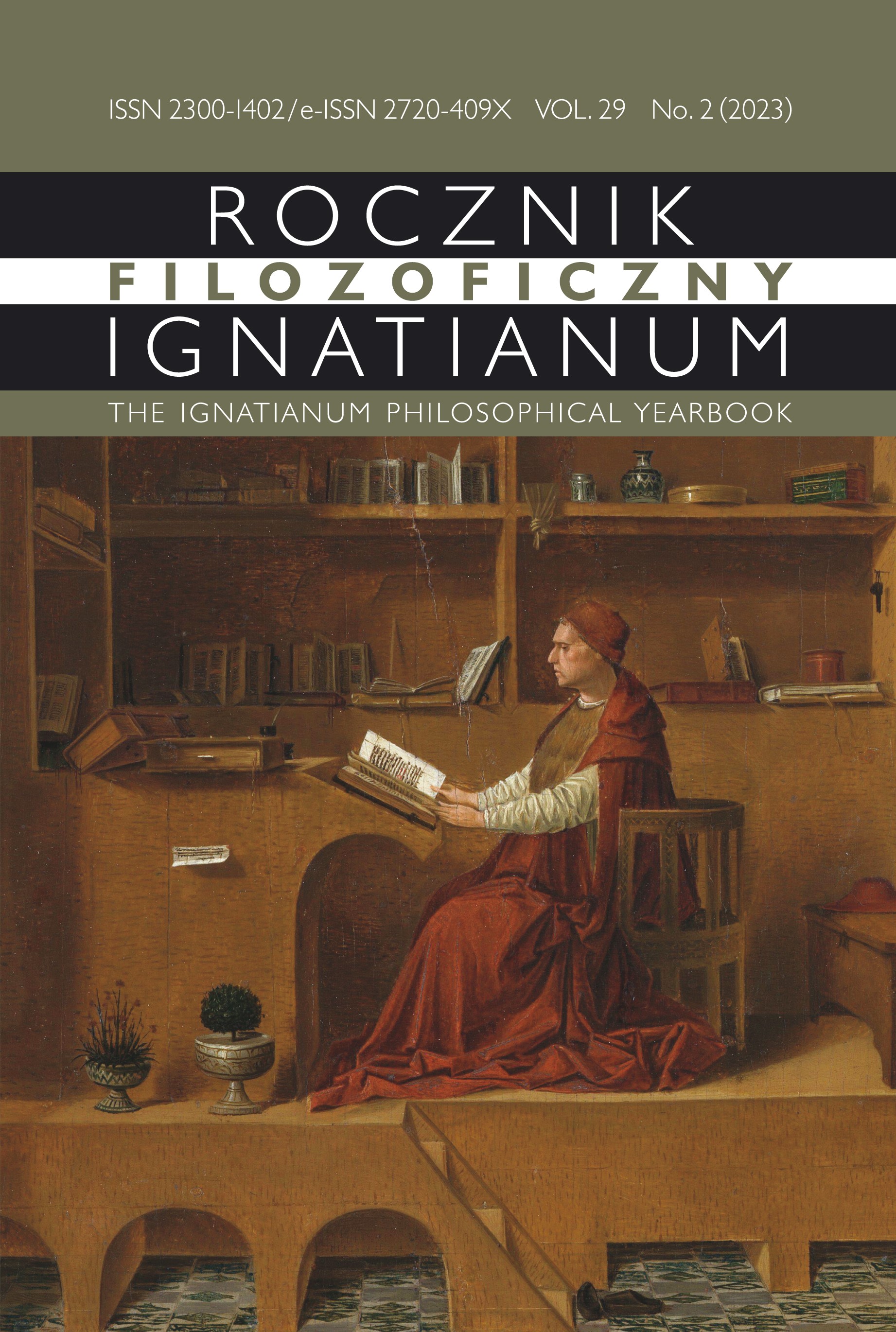The Diagnosis and Perspectives Concerning the Transformations of Western Civilisation
A Comparative Analysis in the Light of Selected Themes in the Thought of Chantal Delsol and the Eco-Philosophy of Henryk Skolimowski
Abstract
The aim of this article is to attempt to capture the differences and similarities relating to Western civilisation that are contained in the thought of the French political philosopher Chantal Delsol and the ecophilosophy of Henryk Skolimowski. The Polish philosopher has built his own philosophical concept on the basis of a radical critique of Western civilisation as a remedy to the contemporary crisis. Chantal Delsol, on the other hand, is a researcher who very insightfully points out the weaknesses and deficiencies of Western civilisation. The first part of the text presents the arguments of both scholars. In the second and third parts, the author discusses similarities and differences between the ways in which the analysed thinkers perceive Western civilisation and postulate possible solutions to the current crisis, which – in the light of the texts of both scholars – is primarily spiritual in nature and derives from the lack of integral and empathetic approach. This text is thus an attempt to characterise some of the diagnoses and prognoses of the two aforementioned authors, which concern both the current situation and the future of Western Civilisation. In addition, the common points and differences between the approaches discussed are pointed out. The article uses the comparative and critical analysis methods.
References
Delsol Chantal., Kamienie węgielne. Na czym nam zależy? Przeł. M. Kowalska, Kraków 2018.
Delsol Chantal., Czym jest człowiek. Kurs antropologii dla niewtajemniczonych, tłum. M. Kowalska Kraków 2011.
Delsol Chantal., Nienawiść do świata. Totalitaryzmy i ponowoczesność, tłum. M. Chojnacki, Warszawa 2017.
Delsol Chantal., Kamienie węgielne. Na czym nam zależy? Przeł. M. Kowalska, Kraków 2018.
Delsol Chantal, Czas wyrzeczenia, tłum. G. Majcher, PIW, Warszawa 2020.
Goff Philip, (2022), Błąd Galileusza. Fundamenty nowej nauki o świadomości, tłum. J. Jarocki, PWN, Warszawa 2022.
Roszkowski Wojciech, Roztrzaskane lustro. Upadek cywilizacji zachodniej, Kraków 2019.
Singh Vir, Al lis mind. The Skolimowskian philosophy of the participatory mind, Partridge, India 2014.
Skolimowski Henryk, The Participatory mind. A new theory of knowledge and of universe, Arkana. Penquin Group, 1994.
Skolimowski Henryk, Zmierzch światopoglądu naukowego¸ Londyn, Odnova Limited, 1974.
Skolimowski Henryk, Wizje nowego millenium, Kraków 1999.
Skolimowski Henryk, Technika a przeznaczenie człowieka, Warszawa 1995.
Skolimowski Henryk, Filozofia żyjąca. Eko-filozofia jako drzewo życia, tłum. J. Wojciechowski, Warszawa 1993.
Bochenek Krzysztof, (2015), Ekologia w kontekście filozofii chrześcijańskiej, Wschodni Rocznik Humanistyczny, T. XI 2015, 139 – 154. Internet: http://wrh.edu.pl/wp-content/uploads/2018/06/Krzysztof-Bochenek_wrh_11_2015.pdf (dostęp: 30.12.2022).
Delsol Chantal, Koniec chrześcijańskiego świata. W: https://teologiapolityczna.pl/koniec-chrzescijanskiego-swiata-chrzescijanstwa-wyklad-prof-chantal-delsol (dostęp: 06.01.2022).
Iwanicka Anna, (2007) Paradygmat holistyczny w ekofilozofii Henryka Skolimowskiego, w: Problemy ekologii, vol. 11, nr 4, lipiec – sierpień. Internet: httpwww_bg_utp_edu_plartpekol_2007iwanicka.pdf (dostęp: 07.01.2023).
Murzyn Marcin, Henryka Skolimowskiego Nowa metafizyka, doktorat, Uniwersytet Pedagogiczny, Kraków, brak daty. Internet: https://rep.up.krakow.pl/xmlui/bitstream/handle/11716/10781/MMurzyn-praca_doktorska.pdf?sequence=1&isAllowed=y (dostęp: 09.01.2023).
Noble David F., Religia techniki. Boskość człowieka i duch wynalazczości, tłum. K. Kornas, Kraków 2016.
Ruchała Sławomira, (2006), Współczesne filozoficzne spory o ugruntowanie praw człowieka. Praca doktorska. Uniwersytet Śląski, Katowice. Internet: https://rebus.us.edu.pl/bitstream/20.500.12128/4982/1/Ruchala_Wspolczesne_filozoficzne_spory.pdf (dostęp: 30.12.2022).
Skolimowski Henryk, Refleksje na temat nowej epistemologii, w: Estetyka i Krytyka (2010)17/18, 213 - 226; Internet: https://yadda.icm.edu.pl/yadda/element/bwmeta1.element.desklight-97c6e5fd-8c18-4c84-a017-c5f8e265a755 (dostęp 03.01.2022).
Wadowski Jan, (2016), W poszukiwaniu adekwatnej antropologii. Trudności i postulaty, w; Ethos 29(2016) nr 4(116) 201-218. Internet: file:///C:/Users/janwa/Downloads/W_poszukiwaniu_adekwatnej_antropolo.pdf (dostęp: 07.01.2023).
The Yearbook only accepts materials for publication that are free of all conflicts of interest, and that in no way involve conflicts over authorship, copyright, etc. The Editors will take action against any cases of plagiarizing, ghostwriting1, guest/honorary authorship2, etc. Where co-authored work is concerned, the Author listed first is expected to take responsibility for the submission, and is required to make clear the contributions of all of the Co-Authors involved. In the event of the publication owing its existence to funding dedicated to this purpose, this fact should be made clear: e.g. in any note of thanks/acknowledgement, or in a footnote, etc. Explicit notification should be given of any form of reprinting, with the appropriate evidence of permission to publish being furnished as required. Any impropriety on the part of Authors/Reviewers risks exposing them to appropriate responses from the relevant institutions.
______
1 This term refers to instances of a person who has made an essential contribution being omitted from the list of authors, or from notes conveying gratitude and/or acknowledgement.
2 This occurs when a person who has made either an insignificant contribution or no contribution at all nevertheless appears on the list of authors.





